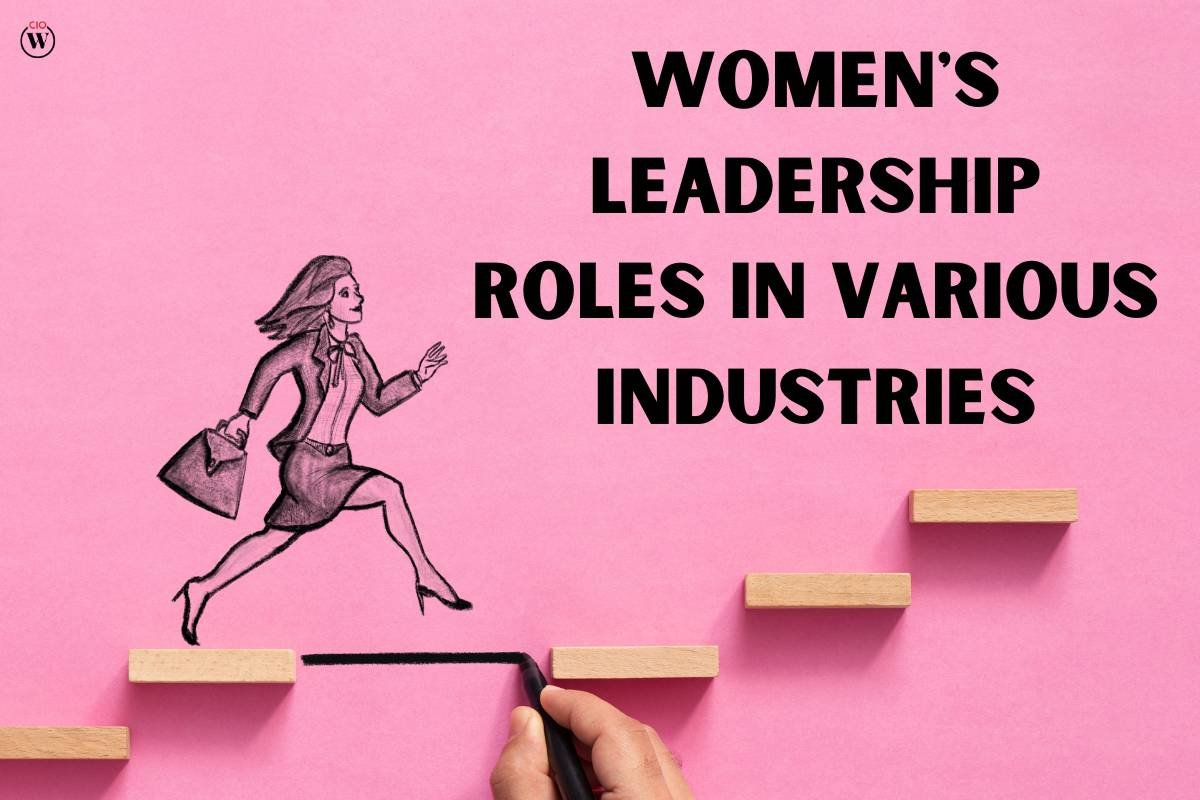Women’s leadership has been a topic of great interest in recent years as more and more women take on leadership roles in various industries. While women have historically been underrepresented in leadership positions, there has been significant progress in recent years toward promoting gender diversity in the workplace. In this article, we will explore the achievements of women leaders in various industries and the impact they are making on their respective fields.
Women’s leadership roles in Various Industries;
1. Tech Industries
One of the most notable women leaders in the technology industry is Ginni Rometty, the former CEO of IBM. Rometty is a computer engineer who joined IBM in 1981 and worked her way up through the company, becoming the first woman to lead the company in 2012. Under her leadership, IBM focused on developing cutting-edge technologies such as artificial intelligence and cloud computing. Rometty has also been a leading advocate for promoting diversity in the workplace and has spoken out about the importance of creating a culture of inclusion and belonging within organizations.
2. Entertainment Industry
In the entertainment industry, Oprah Winfrey is perhaps the most well-known woman leader. Winfrey is a media executive, talk show host, and philanthropist who has built an empire around her brand. She has been recognized for her philanthropic work, including her contributions to education and her support for women’s empowerment initiatives. Winfrey has also been a leading voice in promoting diversity and inclusion in the entertainment industry and has used her platform to advocate for social justice issues.
3. Finance Industry

Another industry where women are making significant contributions to leadership is the finance industry. Sallie Krawcheck, the former CEO of Merrill Lynch Wealth Management and the founder of Ellevest, a digital investment platform for women, is one of the most notable women leaders in finance. Krawcheck has been a vocal advocate for gender diversity in the workplace and has worked to create opportunities for women in the finance industry. She has also been recognized for her contributions to financial literacy and education.
4. Healthcare Industry
In the healthcare industry, Dr. Deborah Birx is a prominent woman leader. Birx is a physician and global health expert who served as the White House Coronavirus Response Coordinator under President Trump. She has been recognized for her leadership during the COVID-19 pandemic and her efforts to promote evidence-based public health policies. Birx has also been a leading voice in promoting gender diversity in the healthcare industry and has spoken out about the importance of empowering Women’s leadership roles.
5. Nonprofit Sector
Women leaders are also making significant contributions in the nonprofit sector. Melinda Gates, co-chair of the Bill and Melinda Gates Foundation, is a prominent woman leader in the nonprofit world. Gates has been a leading advocate for global health and women’s empowerment initiatives, and she has used her platform to raise awareness about critical social issues such as access to healthcare, education, and economic opportunity. She has also been a vocal advocate for promoting diversity and inclusion in the nonprofit sector and has worked to create opportunities for women and people of color in Women’s leadership roles.
Statistics of Women’s Representation in Various Industries:
Despite the progress that has been made in recent years toward gender equality, there are still many industries where women remain underrepresented. Here are 10 industries where women’s representation is particularly lacking:
- Tech: The tech industry has been notorious for its lack of gender diversity. Women make up only 25% of the tech industry workforce, with even lower numbers in Women’s leadership roles.
- Finance: The finance industry has traditionally been dominated by men, and this trend continues today. Women make up only 18% of executive-level positions in finance.
- Construction: Construction is one of the most male-dominated industries, with women making up only 9% of the workforce.
- Mining and Extraction: The mining and extraction industries are also heavily male-dominated, with women making up only 14% of the workforce.
- Aviation: The aviation industry is another industry where women are underrepresented. Women make up only 5% of commercial pilots.
- Agriculture: Agriculture is another industry that is heavily male-dominated, with women making up only 30% of the workforce.
- Manufacturing: Women make up only 29% of the manufacturing workforce, and the number of Women’s leadership roles positions is even lower.
- Energy: The energy industry is another industry that is heavily male-dominated, with women making up only 22% of the workforce.
- Transportation: Women make up only 24% of workers in the transportation industry, and only 5% of truck drivers.
- Science and Engineering: Despite the progress that has been made in recent years toward increasing gender diversity in the STEM fields, women remain underrepresented in science and engineering, with women making up only 28% of the science and engineering workforce.
In order to address these gender disparities, it is important for employers in these industries to prioritize diversity and inclusion in their hiring practices and to create a culture that is welcoming to women. It is also important for women to have access to mentorship and leadership development opportunities to help them advance in their careers. By working together, we can create a more equal and inclusive workforce for everyone.
Importance of Work-Life Balance for Business Women:
Work-life balance has become a buzzword in today’s fast-paced world and for good reason. As more and more women enter the workforce, the need for work-life balance has become increasingly important. A healthy work-life balance can benefit women leaders in numerous ways, from improving their health and well-being to increasing their productivity and job satisfaction. In this essay, we will explore the importance of work-life balance for women leaders.

- Maintaining Good Health and Wellbeing
First and foremost, work-life balance is essential for maintaining good health and wellbeing. When we work long hours or take on too many responsibilities, it can lead to burnout, stress, and even physical health problems such as heart disease and high blood pressure. In contrast, taking time to relax and recharge can help reduce stress and improve overall health. Women who prioritize work-life balance are more likely to have better mental health, more energy, and a better sense of overall wellbeing.
- Increase productivity and job satisfaction
In addition to improving health, work-life balance can also increase productivity and job satisfaction. When we feel overwhelmed or overworked, it can be difficult to focus and perform at our best. On the other hand, when we have time to relax and pursue our personal interests, we return to work feeling refreshed and motivated. women leaders who prioritize work-life balance are more likely to be productive and engaged in their work, leading to better job performance and career success.
- Positive impact on relationships
Moreover, work-life balance can have a positive impact on relationships both inside and outside of work. When we prioritize time for our personal lives, we are better able to connect with our loved ones and build stronger relationships. This can lead to increased happiness and fulfillment both in our personal and professional lives. Additionally, when women model work-life balance, they can inspire their colleagues and employees to do the same, creating a more positive and supportive workplace culture.
- Need Access to Supportive Policies and Practices
However, achieving work-life balance can be challenging, especially for businesswomen who face unique challenges such as gender bias, discrimination, and the expectation to balance caregiving responsibilities alongside work. In order to successfully balance work and life, women need access to supportive policies and practices such as flexible work hours, parental leave, and affordable childcare. Employers can also play a role in promoting work-life balance by creating a culture that values and supports employees’ personal lives and well-being.
- Prioritize Self-Care and Set Boundaries
It is also important for women to prioritize self-care and set boundaries in their personal and professional lives. This may involve saying no to additional responsibilities or setting aside time for self-care activities such as exercise, hobbies, and relaxation. By setting boundaries and prioritizing self-care, women can reduce stress and create a better work-life balance.
Work-life balance is essential for businesswomen to maintain good health, increase productivity and job satisfaction, and build strong relationships both in and outside of work. Achieving work-life balance can be challenging, but with supportive policies and practices, and by prioritizing self-care and setting boundaries, women can successfully balance their personal and professional lives. By promoting work-life balance, employers can create a more positive and inclusive workplace culture that values employees’ well-being and supports their success.
The Best Career Opportunities for Women;
There are many career options available to women today, but some are better suited for women’s strengths, interests, and lifestyles. Here are ten career fields that are well-suited for women:
There are many career options available to women today, but some are better suited for women’s strengths, interests, and lifestyles. Here are ten career fields that are well-suited for women:
- Healthcare: Women are natural caregivers, and healthcare is a field where they can put this trait to good use. Women make up a significant portion of the healthcare workforce, from nurses and medical assistants to doctors and surgeons.
- Education: Women are also natural educators and often find careers in teaching and educational administration. There are many opportunities in this field, including teaching at all levels, curriculum design, and educational leadership.
- Technology: While historically male-dominated, the technology industry is now more inclusive of women. Women can find careers in programming, software development, web design, and other technology-related fields.
- Finance: Women have a natural talent for managing money, and the finance industry offers many opportunities for women. Careers in finance include financial analysts, financial planners, accountants, and investment bankers.
- Law: Women have made significant strides in the legal profession in recent years. Women can find careers in law in areas such as corporate law, litigation, and intellectual property law.
- Marketing and advertising: Women have a unique perspective on consumer behavior, making them valuable assets in marketing and advertising. Women can find careers in market research, advertising, and public relations.
- Nonprofit organizations: Women are often drawn to careers in nonprofit organizations because of the opportunity to make a difference in their communities. Nonprofit careers include program directors, grant writers, and community outreach coordinators.
- Human resources: Women have a natural talent for building relationships, making them valuable in the human resources field. Women can find careers in recruiting, benefits administration, and employee relations.
- Writing and publishing: Women have always been avid readers and writers, making careers in writing and publishing a good fit for many. Careers in this field include freelance writing, editing, and publishing.
- Entrepreneurship: Women are increasingly starting their own businesses and becoming entrepreneurs. Women can find opportunities in various industries, including fashion, technology, and healthcare.

In conclusion, these are just a few of the many career fields that are well-suited for women. Women have a unique perspective on the world and bring valuable skills and talents to the workplace. As more women enter the workforce, it’s important to continue to promote and support their success in all fields.
Still a Long Way to go
Despite the progress that has been made toward promoting Women’s leadership roles in various industries, there is still a long way to go. Women continue to face significant barriers to leadership positions, including discrimination, wage disparities, and a lack of access to opportunities for advancement. It is essential for organizations to prioritize diversity and inclusion in their leadership teams to ensure that they are able to effectively address the complex challenges facing their industries.
Women leaders are making significant contributions to various industries, from technology and finance to healthcare and the nonprofit sector. These women are driving innovation, promoting diversity and inclusion, and advocating for critical social issues. However, there is still work to be done to ensure that women have equal opportunities to lead and succeed in the workplace. By prioritizing diversity and inclusion, organizations can create a more equitable and effective workplace for all employees, and ensure that women have a seat at the table in shaping the future of their respective









